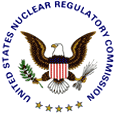 |
NRC NEWS
U. S. NUCLEAR REGULATORY COMMISSION
OFFICE OF PUBLIC AFFAIRS, REGION I
475 Allendale Road, King of Prussia, Pa. 19406 | | CONTACT: |
Diane Screnci (610)337-5330/ e-mail: dps@nrc.gov
Neil A. Sheehan (610)337-5331/e-mail: nas@nrc.gov |
or vld@nrc.gov
I-96-56 August 23, 1996
Contact: Diane Screnci FOR IMMEDIATE RELEASE
Victor Dricks
NRC STAFF PROPOSES $2500 CIVIL PENALTY
AGAINST NATIONAL INSTITUTES OF HEALTH
The Nuclear Regulatory Commission staff has proposed a $2500 fine against the
National Institutes of Health (NIH) for failing to secure from unauthorized access licensed
radioactive materials used in research at the NIH campus in Bethesda, Maryland.
NRC found during inspections beginning on July 6 and October 23 of last year that
small quantities of radioactive materials were kept inside unlocked refrigerators within
unlocked laboratories, with no one present to control access to the materials.
The violations found in July 1995 were identified by an NRC augmented inspection
team, while those identified in October 1995 were found by another NRC special team
inspection. The augmented inspection team was sent to NIH as the result of the ingestion of
radioactive phosphorus-32 by a pregnant researcher and 26 additional NIH staff members.
Investigations of the ingestion of radioactive material have not yet been completed, and
NRC
has not yet reached a decision on enforcement action for these events.
In notifying NIH of the proposed fine, NRC Regional Administrator Hubert J. Miller
said, "It is a significant regulatory concern that NRC inspectors repeatedly have been able
to
gain access to licensed materials at your facility without challenge, because it indicates that
members of the public may do so as well."
The NRC is particularly concerned with the number of examples of this violation and
the fact that previous violations of security requirements were identified during NRC
inspections in April through May 1994, and in June 1995, Mr. Miller said.
NRC acknowledged that NIH has recently taken corrective actions, including immediate
confiscation of unsecured radioactive materials, amendment of its security policy and
initiation
of a security monitoring program. However, these corrective actions were not appropriately
comprehensive to prevent recurrence of the security violations, NRC said. An additional
NRC
inspection on November 7 through 9, 1995, identified three more instances in which
unattended licensed radioactive materials were not locked up.
The NRC also cited NIH for several other violations, for which fines were not proposed.
The additional violations include:
-- Workers not wearing extremity radiation monitoring badges, and not returning
the film badges and ring badges each month, as required;
-- Users obtaining radioactive materials without providing required information
regarding the identity of the intended users or the signature of an authorized
investigator;
-- Researchers performing licensed activities without first receiving required
training; and
-- Failing to perform thyroid bioassay measurements of researchers who handled
certain quantities of Iodine-125.
NIH has 30 days either to pay the fine or protest its imposition.
|
